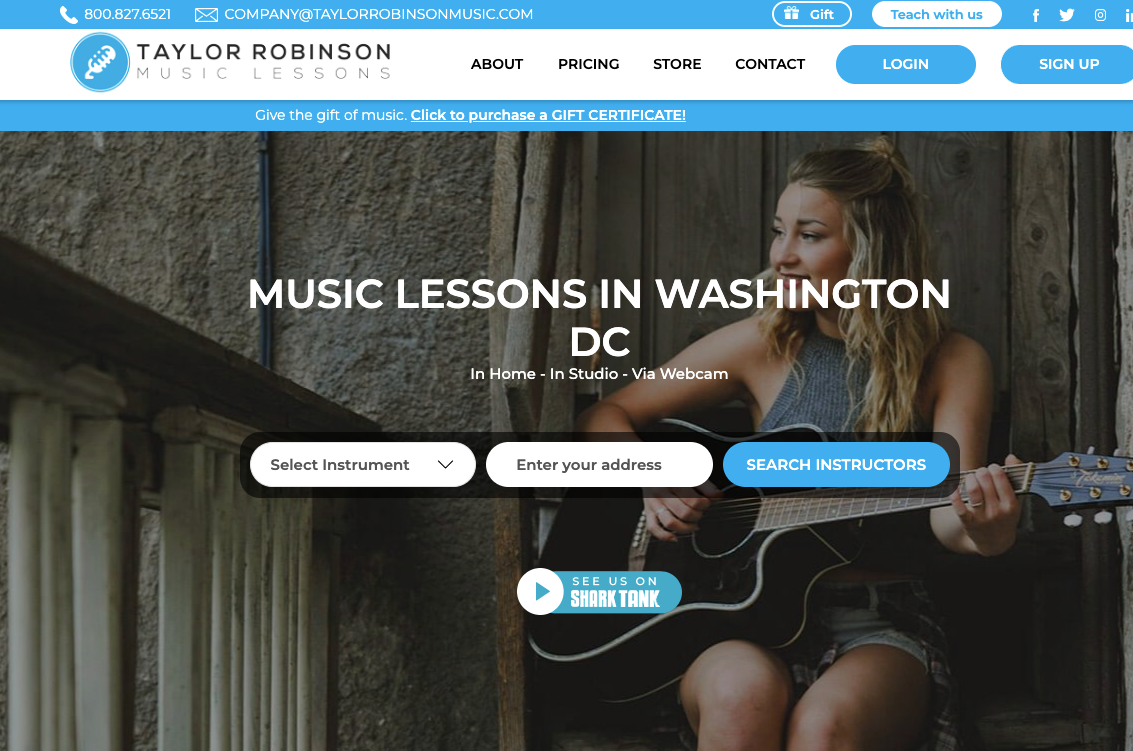Washington, District of Columbia is known for its vibrant music scene, with a rich history of jazz, go-go, and R&B music. With so many talented musicians and performers in the area, it’s no surprise that there are numerous opportunities for aspiring singers to take their skills to the next level.
Whether you’re a beginner looking to hone your singing skills or a seasoned performer looking to refine your technique, there are plenty of voice lessons available in the DC area. These lessons can help you improve your range, develop better breath control, and master the art of stage presence.
But with so many options available, it can be overwhelming to choose the right singing or voice lesson for you. That’s why we’ve compiled a list of the 10 best singing and voice lessons near Washington, DC. Our list includes lessons for all ages and skill levels, and offers a variety of teaching styles and approaches.
From classical vocal training to pop and rock singing lessons, there’s something for everyone on our list. So whether you’re looking to pursue a career in music or simply want to improve your singing for personal enjoyment, read on to discover the best singing and voice lessons in Washington, DC.
1. HUM District Music

Website: http://www.humdistrictmusic.com/
Address: 3527 13th St NW, Washington, DC 20010
HUM District Music is a premier music school located in the heart of Washington, DC. With a team of experienced and talented instructors, HUM District Music offers top-notch music lessons for students of all ages and skill levels. Whether you’re a beginner or an experienced musician, HUM District Music has a program that can help you reach your musical goals.
The school offers a range of music lessons, including guitar, bass, drums, piano, and vocal training. In addition to private lessons, students can also participate in group classes and workshops, as well as attend live performances and events hosted by HUM District Music.
The school prides itself on its welcoming and supportive environment, where students are encouraged to develop their own unique style and musical voice. With a commitment to excellence and a passion for music education, HUM District Music is a top choice for anyone looking to learn and grow as a musician.
2. TR Music & Voice Lessons

Website: https://www.taylorrobinsonmusic.com/Washington-music-lessons.html
Address: 769 Girard St NW, Washington, DC 20001
TR Music & Voice Lessons is a music school located in Washington, DC, that provides high-quality music and voice lessons to students of all ages and skill levels. The school is committed to helping its students achieve their musical goals, whether they are looking to pursue music as a career or simply want to learn for personal enjoyment.
TR Music & Voice Lessons offers a range of music lessons, including guitar, bass, drums, piano, and voice lessons. Students can choose to take private lessons or group classes, and the school also offers online lessons for those who prefer to learn from the comfort of their own home.
The instructors at TR Music & Voice Lessons are experienced professionals who are passionate about music and dedicated to providing the best possible learning experience for their students. With a focus on individualized instruction and a supportive learning environment, TR Music & Voice Lessons is an excellent choice for anyone looking to develop their musical skills and reach their full potential.
3. Joyful Singing

Website: http://www.joyful-singing.com/
Address: 538 25th Pl NE, Washington, DC 20002
Joyful Singing is a music school in Washington, DC that offers private voice lessons to students of all ages and skill levels. The school’s mission is to help students discover their unique voice and develop the skills they need to become confident and expressive singers.
Joyful Singing’s curriculum is tailored to each student’s individual needs and goals, and the school’s experienced instructors work closely with students to create a personalized learning plan. In addition to vocal technique, students learn about music theory, performance skills, and song interpretation.
The school’s founder, Liz Sutton, is an accomplished singer and teacher with over 25 years of experience. She has performed with a variety of ensembles and has taught voice at several universities and music schools.
With a focus on creating a supportive and positive learning environment, Joyful Singing is an excellent choice for anyone looking to improve their singing skills and find joy in their musical journey.
Tips for Learning How to Sing
Singing is a beautiful and rewarding art form that can bring joy to both the singer and the audience. However, for those who are new to singing, the process of learning how to sing can be challenging and intimidating. But with the right approach, anyone can learn how to sing and improve their vocal skills. In this article, we will share some tips for learning how to sing that will help you become a more confident and skilled singer.
Tip #1: Find a Good Teacher
The first and most important step in learning how to sing is to find a good teacher. A good teacher will help you develop proper singing techniques, provide constructive feedback, and guide you through the process of learning to sing. Look for a teacher who is experienced, knowledgeable, and passionate about singing. You can find a teacher through local music schools, private instructors, or online resources.
Tip #2: Practice Regularly
Learning how to sing requires consistent practice. Make a commitment to practice regularly, even if it’s just a few minutes a day. Practice helps you develop muscle memory, improve your vocal range, and strengthen your voice. Set specific goals for your practice sessions and track your progress over time. Consider recording yourself to hear how you sound and identify areas where you need to improve.
Tip #3: Warm Up Before Singing
Before you start singing, it’s important to warm up your voice. Just like any other physical activity, singing requires you to warm up your muscles to avoid injury and improve your performance. Start with some basic vocal exercises, such as humming or lip trills, to loosen up your vocal cords and prepare your voice for singing.
Tip #4: Focus on Breath Control
Breath control is an essential component of singing. Proper breathing helps you produce a strong and clear sound, sustain long notes, and maintain consistent pitch. Practice breathing exercises, such as diaphragmatic breathing, to improve your breath control. Focus on breathing deeply and exhaling slowly and steadily.
Tip #5: Pay Attention to Posture
Good posture is crucial for singing. Stand up straight with your shoulders relaxed and your feet shoulder-width apart. Keep your chin parallel to the ground and avoid tilting your head up or down. Good posture helps you breathe more easily and produce a clear and powerful sound.
Tip #6: Improve Your Pitch
Pitch is one of the most important elements of singing. To improve your pitch, practice singing scales and intervals. Start with simple exercises and gradually increase the difficulty as you improve. Focus on hitting the notes accurately and maintaining a consistent pitch.
Tip #7: Develop Your Tone
Tone refers to the quality of your voice. A good tone is clear, consistent, and pleasant to listen to. To improve your tone, practice singing with proper breath control and good posture. Experiment with different vowels and consonants to find the ones that work best for your voice. Pay attention to the resonance of your voice and try to produce a rich and full sound.
Tip #8: Emphasize Dynamics
Dynamics refer to the variations in volume and intensity of your voice. A good singer knows how to use dynamics to create emotional impact and expressiveness in their performance. Practice singing with different levels of volume and intensity to improve your dynamics. Experiment with soft and loud singing, as well as gradual changes in volume and intensity.
Tip #9: Sing with Expression
Expression is another important element of singing. A good singer knows how to convey emotion and connect with their audience through their performance. Practice singing with emotion and feeling. Focus on the lyrics and the story behind the song, and try to convey the meaning and emotion through your singing.
Tip #10: Listen to Yourself
One of the best ways to improve your singing skills is to listen to yourself. Record yourself singing and listen to the playback.

